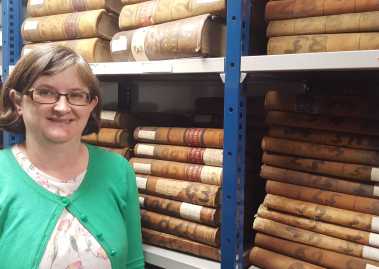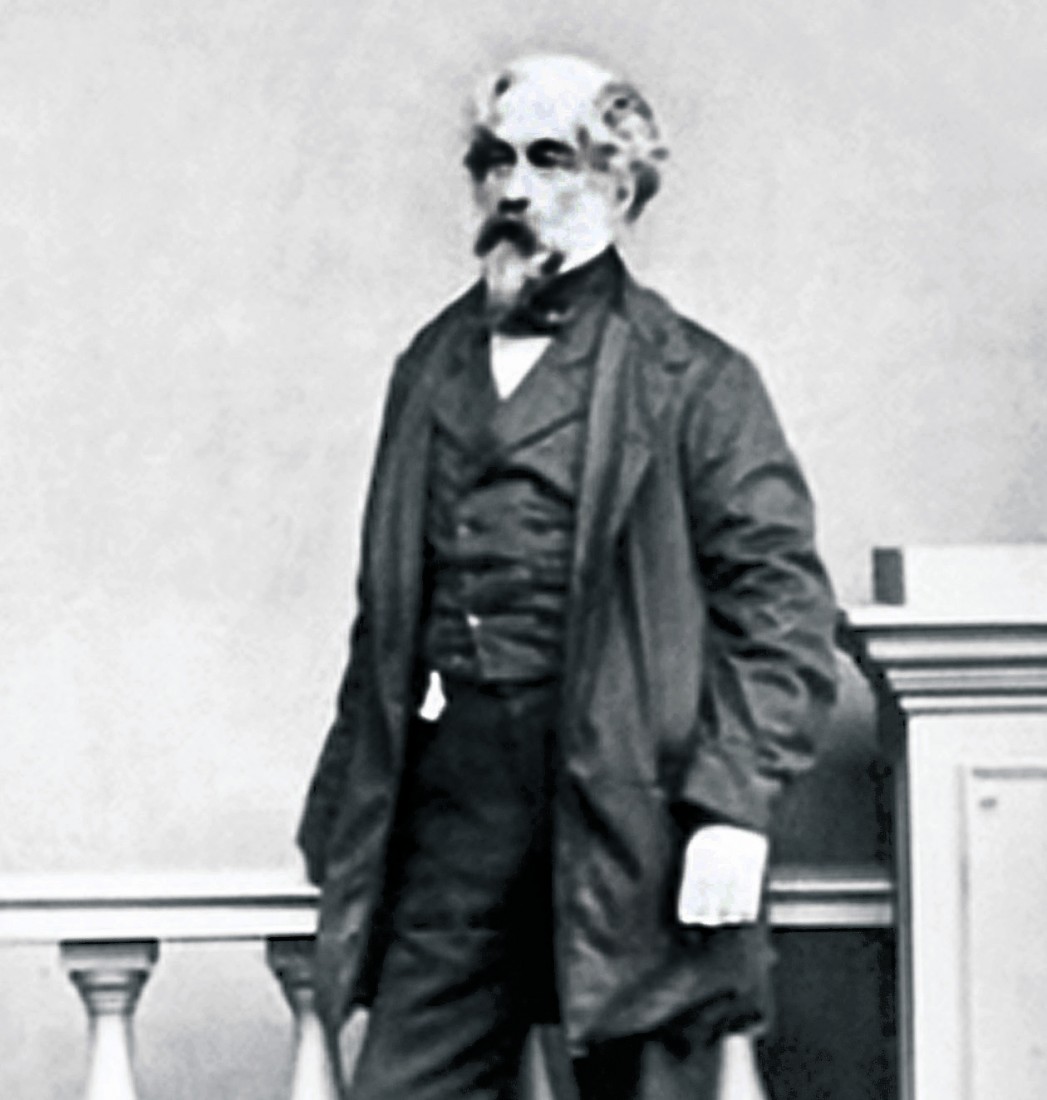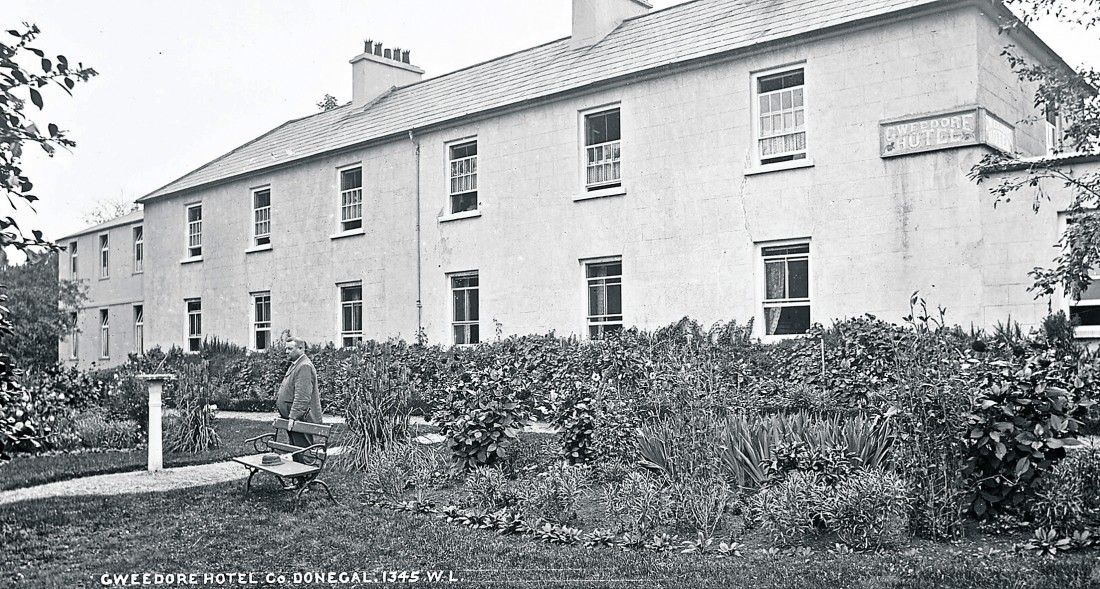In 1838, politician and landowner Lord George Hill purchased a large estate in Gweedore – up to 23,000 acres – and built and opened the Gweedore Hotel shortly afterwards.
A mere 184 years later, Donegal County Archivist, Niamh Brennan is constructing its story through images and words – and quoting from two still existing visitors books that tell a story of the times through the literary leanings of its guests.
“Both of the visitors books contain a variety of utterly fascinating and often enlightening comments, long essays, poems and sketches and treatises on the local society and economy which visitors acquainted themselves with over the course of their stay in the area,” Niamh tells her audience at the Cathedral Quarter Literary Festival.

Donegal County Archivist Niamh Brennan.
“Themes vary from the very serious to the more light-hearted, from praising reforms and the beneficial nature of the landlord, the gratitude or otherwise of the peasants, the effects of the Famine, emigration, the natural beauty of the rural setting, to cutting remarks about fellow visitors, and reviews of the hotel itself.”
In short, not quite the general remarks – “lovely breakfast”, “friendly staff”, “T.V. not working” – found in the visitors books of today’s hotels!
“That the majority of the comments are very favourable towards Hill, pictured below, isn’t surprising, given that Hill owned the hotel and that many, if not the majority, of visitors were his friends, associates or fellow landowners and wealthy businessmen and their families/friends”, the County Archivist relates.
“His subsequent attempts to replace the local rundale system of subdivision of land with modernised farming practices was met with local opposition. In 1845 Hill published an often derided and debunked booklet ‘Facts from Gweedore’ which set out to justify his reforms, emphasizing his many endeavours such as building a harbour and grain store in Gweedore as well as trying to develop local enterprises.”
But, the County Archivist reveals, there was much resistance to his reforms, particularly when he brought in tenants from Scotland for the purpose of large scale sheep grazing that escalated into the famous ‘sheep war’ of Gweedore.
His own literary publication may have been debunked but George Hill was to go on to marry – not at the same time of course! – two of the nieces of one of the great writers of the time, Jane Austen.
First to walk down the aisle with him was Cassandra Jane Knight with the couple living in Gortlee House in Letterkenny.
Following the birth of her fourth child, Cassandra died of puerperal fever on March 14, 1842 and is buried in Conwal Parish Church graveyard in Letterkenny.
Her sister, Louisa, moved to Ireland from England to help care for the children.
“George and Louisa married in 1847 – a scandal at the time which was raised in parliament,” Niamh disclosed. They resided at Ballyare House in Ramelton.

Politician and landowner Lord George Hill
The Knight family and Lord George Hill Photograph album, which is on display at the Donegal County Museum, includes images of Hill and extended Downshire family members. In addition it features a number of Jane Austen’s great-nieces and nephews.
“Some members of the family and friends who feature in the album also visited the hotel.”And would have been among the many who put pen to parchment to record their impressions of, not just the hotel itself, but the local landscape and the lives of those who lived there.
On Wednesday August 31, 1842, the following remarks were penned. “I dined and slept last night in this here inn and have found everything in it, the bed, entertainment very comfortable and I have no doubt the landlord and his wife will continue to deserve the good opinion of their customers and the support and favour of their employer as they are both of them county of Donegal people.
“I feel an interest in their welfare which must depend on their own merits – this inn has been extremely well built and is well suited to its situation and I hope that Lord George’s excellent object, that of improving the mountainous district, possessed as it is of many natural advantages, will ere to be crowned with well merited success.”
The comment was simply signed ‘Downshire’ – none other than a brother of Lord George Hill!
November 3, 1844, and J. Henry Parkinson from Dublin writes: “I consider that the reclamation of waste land which is in progress in this wild district should be a sufficient inducement to prevent many persons from emigrating to America.”
The following year on August 19, the comments took on an official line with John Mitchell and John O’Hagan stating that they had visited Gweedore to report to the Government the state of the county, and to recommend the best means of relief.
“The store at Gweedore possesses every facility of forming a depot which could not have been found in any other part of this locality and the want of such an accommodation at this moment might have been attended with the most serious consequences to the poor – what an example does the progressive improvement about Gweedore offer to all Irish landlords.”
A visitor in 1846, meanwhile, was praising the hotel and its owner at a time when the Famine had caught hold. “I have often visited Gweedore Hotel but at no period with greater pleasure than this.
“The deep and heartfelt interest Lord George Hill is now, at such an awful crisis of distress and famine owing to the total failure of the potato crop, showing to [alleviate?] the probable wants of his tenantry. Would to God there was a Lord G. Hill in every parish in Ireland.”
Eighteen hotel guests put their names in the visitors book with enthusiastic tributes to the proprietor. “The undersigned, having been present at the Annual exhibition of manufactures at Bunbeg, and the consequent distribution of prizes to Lord G Hill’s tenantry, desire to express the gratification they experience, not only at witnessing and sharing in the business of the day, but also in observing the happy intercourse subsisting between the noble landlord and his people, which disperses a cheering ray amidst the general gloom of present time.”
Henry Carre, having travelled the comparatively short distance from Glencolmcille, is equally enamoured when he writes on June 2, 1848: “After the lapse of nearly four years and in the company of the same valued friend, I again visit these extraordinary scenes; and not merely would I acknowledge the attention I have met with, and the comfort I have enjoyed, in this excellent hotel but record the pleasure with which I have just inspected 15 acres of splendid rye grass and clover on a part of the hotel farm which on my first visit I saw in the state of nature and in progress of preparation for the receiving of a crop.”
Thomas Carlyle, the established philosopher who travelled across Ireland in 1849, is another to go away impressed with all he sees: “Have seen Gweedore, with joyful astonishment, with many feelings not to be written. Could but all Irish landlords, ‘See examine, go and do likewise!’ Join with all men, in wishing every prosperity to such an enterprise.”
Referring to the second Visitors Book, Niamh points out that it contains many comments from visitors from Ireland and abroad on the beauty and untamed nature of the landscape, on the comforts of the hotel and on the political situation of the time.
“There is also much unusual, fanciful, witty and literary commentary. Use of the forms of both prose and poetry is common particularly for remarking on the tense political climate including the ongoing bitter Sheep War.”
She quotes some of the more benign comments including “Gweedore Hotel and the views from the top of Errigal are, each in its way, perfect (1859); while a visitor from London remarks: “My eleventh visit to Gweedore. I find each year the place more enchanting.”
But not all the views are positive with one individual penning an unstructured rhyme to describe his opinion:
“For sheep destruction, landlord rule and comfort ‘rich and rare’, Gweedore is famed through Erin’s isle, this note book doth declare, but tenant slaves are crouching here, beneath their tyrant’s sway, and grimly curse the hour their moors became the Scotchman’s prey. And though the traveller must confess, Lord George Hill has striven well to make his stay right pleasant here at this his own hotel, yet truth will urge the candid man to speak his feelings free and cry against the power he wields against his tenatry”, the signature of Shaun (the Sheep?!) inscribed in December 1857.
It was said that following his election as M.P. for Carrickfergus in 1830, Lord George Hill never spoke in parliament.
But the visitors books, that form a significant part of the County Archives treasure and can be digitally accessed, say even more than he could about his influences in Gweedore and the hotel – now the An Chúirt – that drew guests and comments in equal measure.










